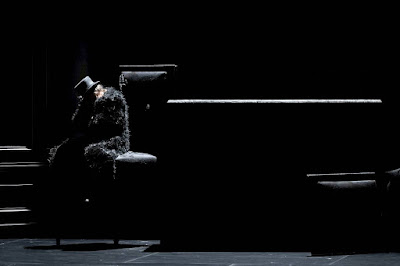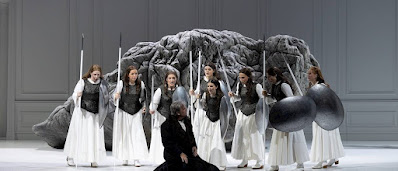Richard Wagner - Götterdämmerung (Zurich, 2024)
Opernhaus Zürich, 2024
Gianandrea Noseda, Andreas Homoki, Klaus Florian Vogt, Daniel Schmutzhard, Christopher Purves, David Leigh, Camilla Nylund, Lauren Fagan, Sarah Ferede, Freya Apffelstaedt, Lena Sutor-Wernich, Giselle Allen, Uliana Alexyuk, Niamh O'Sullivan, Siena Licht Miller
Zurich Opera Ring für alle - 26th May 2024
If there's initially a sense that the 2024 Opernhaus Zürich's Der Ring des Nibelungen cycle is getting a little tired and lacking in surprises by the time we get to Götterdämmerung, it's probably as much to do with the opera itself as the production. When you get this far, it can sometime feel like a duty just to see the cycle through to the end rather than any expectation of surprises or twists being pulled out at this late stage in a production. But see it through you must, just for the powerful conclusion that the whole story had been moving towards from very early on, and even if those surprises are fewer, the quality and consistency that has characterised the previous parts is carried through here impressively.
The only ones indeed not able to predict how the remainder of the production play out are ironically the three Norns. The universe of this Zurich production remains within the familiar backdrop of a rotating stage of rooms, the high panelled walls white again after the darkness of Siegfried. Or a little off-white maybe. The world of Götterdämmerung looks worn and neglected, a little battered, the white paint yellowing, cracking and peeling. The three Norn struggle to hold the strands of the rope of fate together, the events that the gods have enacted have worn it down, their fate is now unknown. We on the other hand have some idea of what to expect, at least as far as how the colour schemes present it.
A Rasputin-like Hagen is most definitely dressed in black for this work's divisions of those who serve nature and those whose actions hasten its destruction. The Gibichung break the simple colour coding however; Gunther and Gutrune, wearing red jackets, are of a different mold to the grand mythical forces of black and white in conflict. The time of the Eternal Ones and heroes is past, Siegfried's grey turning into a black and white suit by the time of his wedding to Gutrune and betrayal of Brünnhilde. The thread has been broken, the Sacred Ash destroyed. the Norn perhaps colour blind and therefore unable to see into the unknown future where now only destruction looms.
In this world where we are heading towards the end of an era, the key scene of Siegfried's betrayal of Brünnhilde is crucial and achieved highly effectively here. Siegfried wears the Tarmhelm while Gunther shambles on like a monster version of himself in a mask. Brünnhilde’s horror is felt, but there is the suggestion when she accidentally tears off the Tarnhelm in a struggle for the ring and momentarily glimpses the true face of Siegfried, that she lets herself succumb to the curse that has befallen all of them, a fate that she has already been forewarned off by her sister Valkyrie, Waltraute.
Again, it's the smallest of touches that make the difference here, such as a dejected Wotan making a cameo appearance in Valhalla, Freia's golden apples untouched. It might look like it's just trying to fill out what otherwise looks fairly bare minimal staging, but it's not. Such little details count here, making it feel relatable, like something human is really at stake and not just a grand myth. If you want to see the destruction of the World Ash and demand of Waltraute that Brünnhilde abandon the Ring and all it stands for as a commentary of capitalism exploiting the natural resources and the end of that road leading to climate change destruction unless nature (the Rhinemaidens) is respected, it's there clearly if you want to see it that way, even if none of it is made explicit in the staging. Not that I'm claiming that Wagner was a very early advocate of Green policies, but it's a theme that is large enough to be held within the grand mythology of Der Ring des Nibelungen.
The singing keeps up the remarkably high standards and consistency of the previous parts of the cycle. And when you have good direction as you have here under Andreas Homoki, it means you can enter fully into the purpose and intent of the work. Klaus Florian Vogt can still get away with an ideal mix of youthful naivety and enthusiasm, if not quite the vocal force you expect (but which it rarely attains) for this role. There is an excellent performance here from Camilla Nylund as Brünnhilde, particularly in her confrontation and accusations of the betrayal by Siegfried. It's fitting that she outshines Vogt in this scene in her outrage. I was really impressed with her performance throughout the second Act, necessary to gives the opera the weight, grief and tragedy it needs at the tragic conclusion. David Leigh, who was the dragon Fafner in Siegfried, here takes the role of Hagen with great power and depth, his delivery clear and ominous throughout. Daniel Schmutzhard and Lauren Fagan sing the roles of Gunter and Gutrune roles well. Christopher Purves is once again brilliant as the dark and bitter Alberich.
Again, I am in awe of the musical performance here of the Philharmonia Zürich under Gianandrea Noseda. I've never rated Götterdämmerung all that highly compared to the more popular and widely performed parts of Der Ring des Nibelungen, once in jest unfairly and inaccurately suggesting that it was little more than as a compilation of variations of the leitmotifs from the earlier works, but the beauty and delicacy of the score, particularly in the linking orchestral interludes, is brought out wonderfully in this performance. The weight is perfectly balanced and emotionally attuned without ever slipping into bombast. Perhaps the close attention paid to the detail of the drama and singing help this, but that's not to take anything away from the quality of the musical direction and performance.
As the opera moves towards its conclusion it's clear that there are no major new ideas or grand concept employed here and that the success of the production lies rather in the fact that it is just very good direction that is completely in service to the drama. You look at the deceptively simple minimalism of the sets and colour schemes and wonder how it can still be so effective in establishing mood and drama, and yet it is indeed one of the most effective stagings of Der Ring des Nibelungen that I have seen. It doesn't put a foot wrong anywhere. The mood is right, the acting and singing is of the highest standard, it works hand-in-hand with the musical performance, but what really drives it is the interaction between all those elements. These are not individual performances or creative indulgences, it's a collective ensemble performance, interacting, giving and taking, acting and reacting. And maybe it's there, in how it finds a way for the spectator to connect meaningfully with this grand formidable work of mythology, that this Zurich Ring succeeds so impressively.
External links: Opernhaus Zürich, Ring für alle Video on Demand
Photos - Monika Rittershaus















